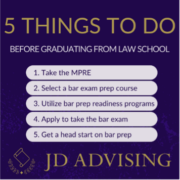February 2020 Uniform Bar Exam Recap | JD Advising
February 2020 Uniform Bar Exam Recap | JD Advising
In our blog post, we give you a recap of the February 2020 Uniform Bar Exam, including what was tested on the February 2020 Multistate Essay Exam (MEE) and the February 2020 Multistate Performance Test (MPT).
Note that we had to delay in posting this until NCBE answers were released in June, given that the NCBE now restricts any of its licensees from discussing the exam until official answers are released. We hope you did not mind the delay in posting this. Please read the full recap below!
February Uniform Bar Exam Recap
February 2020 Multistate Essay Exam (MEE)
For the most part, the issues tested on the essays were more in line with the most frequently tested topics, which most likely resulted in a less generous curve than the July 2019 exam. This time the Examiners chose to test more of the MBE subjects on the essays, rather than equally testing the MBE and MEE-only subjects. We were thankful to predict more than 70% of the subjects that were tested (Agency, Contracts, Real Property, Secured Transactions, and Evidence). We did not predict Civil Procedure (as it is not tested as consistently anymore) or that Evidence would be combined with a Criminal Law issue (this was the first time that this crossover appeared on the exam). We thought that Trusts and Constitutional Law would be tested but they did not appear on the exam, thus, making it more likely that those subjects will be tested in July 2020.
The following subjects were tested on the MEE:
As part of our recap of the February 2020 Uniform Bar Exam, we list the topics that were tested on each essay. However, this is not meant to be an exhaustive list. You may have discussed different/additional issues and still have received a significant amount of credit or even full credit.
Agency
This fact pattern was more than one page in length and asked examinees to answer four questions. The key issues raised by this fact pattern are actual authority, apparent authority, whether an agent will be liable to a third party when there is a disclosed principal, whether a principal may vicariously liable for the torts of an agent, and whether a principal may be directly liable to plaintiff for injuries caused by her negligent selection of an agent. (Note: We did predict that Agency would appear on the exam, and it did! While we thought this subject would appear in conjunction with Torts, it was tested on its own. This essay covered nearly all of the issues that we told our UBE course and MEE seminar students to review.)
Civil Procedure
The Civil Procedure question was about three-quarters of page long and asked examinees to answer two questions: 1) whether a plaintiff may permissively join multiple defendants in a lawsuit and 2) whether a defendant may implead a party as a third-party defendant to seek indemnification. Unlike the July 2019 exam, this Civil Procedure question was more straightforward. (Note: While we did not predict that Civil Procedure would be tested, we nevertheless emphasized to our UBE Course and MEE Seminar students to take a close look at each of these commonly tested issues.)
Contracts
Very much like the Agency question, the Contracts fact pattern was very detailed and more than one page long. Examinees were tasked with answering two questions, namely whether the homeowner was required to pay the contractor for the kitchen remodel and the bathroom remodel. The Examiners expected test takers to identify the predominant purpose test and conclude that common law applies. Further, the fact pattern focused upon substantial performance, material breach, and what damages may be recovered for a breach of construction contract. While the contractor did not substantially perform on the kitchen remodeling contract, he did substantially perform on the bathroom remodeling contract. (Note: We predicted Contracts as our wildcard subject and it did appear on the exam! We also told our students to review common law contract principles, including substantial performance and damages.)
Evidence/ Criminal Law
The Evidence/Criminal Law fact pattern was exactly one page in length, and much like past Evidence questions, it was a racehorse question that touched upon many issues. However, this is the first time that Evidence was combined with Criminal Law. In the past, when Evidence was crossed over with another subject, it was tested in conjunction with Criminal Procedure. Notably, this fact pattern explicitly noted that examinees should not discuss constitutional issues (meaning that this was not testing Criminal Procedure). The sole criminal law issue presented was self-defense. The remainder of the question was reminiscent of previous evidence questions, in that it tested relevancy, adoptive admissions (nonhearsay), context for an individual’s assertive conduct (nonhearsay), the then-existing state of mind hearsay exception, character evidence, and impeachment (a five-year-old shoplifting conviction and bias). (Note: We predicted that Evidence would be tested, and indeed it was! We also told our students to carefully study the majority of these issues. However, we did not predict that Criminal Law would be tested. Instead, we suspected a crossover with Criminal Procedure and this did not occur.)
Real Property
The actual Real Property fact pattern was approximately half a page long, but interestingly, exam takers were asked to answer five questions about the nuances of joint tenancies with the right of survivorship. Of note, the majority of the questions asked examinees to assume certain facts when answering specific calls. Thus, this question required test takers to quickly change gears when writing their responses. Examinees were asked to explain how a joint tenancy may be established, whether a tenancy could be severed in a title theory jurisdiction by entering into a lease or unilaterally executing a mortgage, and the rights of joint tenants regarding possession and rental income. (Note: We predicted that Real Property would be tested and it did appear on the exam! We told all of our students and seminar attendees to review all aspects of joint tenancies.)
Secured Transactions
The Secured Transactions fact pattern was one page long and quite detailed. This, question, like all Secured Transactions essays touched upon the attachment of a security interest. In addition, examinees were asked to discuss the doctrine of after-acquired collateral, to identify that a lender may take a security interest in a debtor’s accounts, and to explain that when a borrower defaults on its payments, the secured party has the right to seek payment from an account debtor by providing notification of the assignment of the account. This was a challenging question, in particular because these issues have only been tested a handful of times (and most recently, in July 2017). (Note: We predicted that Secured Transactions would be tested and it show up on the exam! We covered the particulars of account debtors in our UBE Course. However, we did not touch upon these issues in our MEE Seminar as they are not frequently tested).
On the whole, we are quite happy that we predicted five of the seven subjects that were tested on the February 2020 Uniform Bar Exam (and many of the issues!).
February 2020 Multistate Performance Test (MPT)
We predicted that examinees would be asked to draft an objective memo and this was the first task that appeared on the exam. Specifically, this MPT tested issues relating to professional responsibility and many students found this MPT to be quite challenging because they had to address whether the plaintiffs’ lawyers could communicate with five different employees of the defendant without first obtaining the defendant’s consent. Each employee should have been discussed separately. Further, examinees were asked to explain whether the defendant would be permitted to communicate with any named plaintiffs or potential members of the class without the consent of opposing counsel. Many test-takers reported that they ran out of time on this MPT.
As for the second MPT, we predicted that an opinion or demand letter would be tested, but instead the Examiners asked test-takers to tackle a less common task—a closing argument. As with all less commonly tested tasks, the Examiners provided additional guidance after the task memo. Specifically, the formatting memo included detailed instructions regarding how to draft a closing argument. This persuasive task asked examinees to explain why the marriage at hand should be annulled and why the will at issue should be set aside.
We hope you found our recap of the February 2020 Uniform Bar Exam helpful! If you are looking for detailed feedback on your essays and MPTs, please feel free to reach out to us to schedule a bar exam consultation.
Note: Please keep in mind that because the essays and MPTs on this exam were more in line with the commonly tested issues and tasks, we expect the written portion of the July 2020 exam to be slightly more nuanced! We also expect to see less traditional bar exams, given that three will be administered by the NCBE this summer/fall (not to mention an October exam, which the NCBE has not provided much detail on).
Looking to Pass the Bar Exam?
Free Resources:
- 🌟Bar Exam Free Resource Center: Access our most popular free guides, webinars, and resources to set you on the path to success.
- Free Bar Exam Guides: Expert advice on the MBE, the MEE, passing strategies, and overcoming failure.
- Free Webinars: Get insight from top bar exam experts to ace your preparation.
Paid Resources:
- 🏆One-Sheets: Our most popular product! Master the Bar Exam with these five-star rated essentials.
- Bar Exam Outlines: Our comprehensive and condensed bar exam outlines present key information in an organized, easy-to-digest layout.
- Exclusive Mastery Classes: Dive deep into highly tested areas of the MBE, MEE, MPT, and CA bar exams in these live, one-time events.
- Specialized Private Tutoring: With years of experience under our belt, our experts provide personalized guidance to ensure you excel.
- Bar Exam Courses: On Demand and Premium options tailored to your needs.
- Bar Exam Crash Course + Mini Outlines: A great review of the topics you need to know!
🔥 NEW! Check out our Repeat Taker Bar Exam Course and our new premier Guarantee Pass Program!






Leave a Reply
Want to join the discussion?Feel free to contribute!